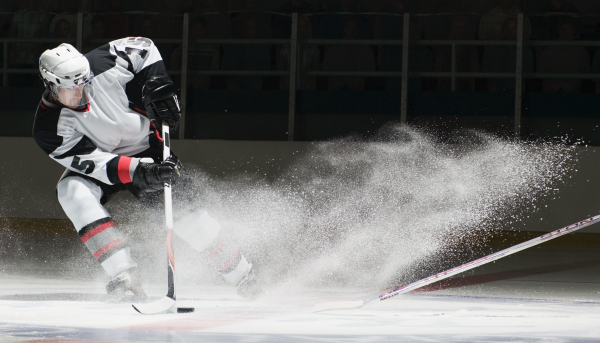KID REPORTERS’ NOTEBOOK
A Veteran Sportswriter Offers Reporting Tips
“Sometime around 18 years old or so, I realized I probably wasn’t going to be a professional athlete,” says Tarik El-Bashir, senior writer at The Athletic. “But I knew I wanted to be involved in sports somehow.”
Tarik El-Bashir is a senior writer at The Athletic, a sports journalism website that is now part of The New York Times. El-Bashir, who grew up in Maryland, has spent two decades writing about the professional sports teams in Washington, D.C. He currently covers the Washington Capitals, a team in the National Hockey League (NHL).
In the past, El-Bashir covered the Washington Commanders and the men’s basketball team at Georgetown University. He has worked for several outlets, including The Washington Post and NBC Sports Washington. I recently asked El-Bashir about his career as a sportswriter and his love of sports. A few days after we spoke, the Times announced that it would rely solely on The Athletic for its sports coverage. Here are highlights from our conversation, which has been edited for length and clarity.
Why did you choose sports journalism?
I was an athlete growing up. I played ice hockey, football, and baseball. When I was about 18, I realized that I wasn’t going to be a professional athlete. But I knew I wanted to be involved in sports somehow. I started talking to people in sports. There were two routes I could have taken. I thought about being a sports agent. That's hard. You have to go to law school, and it takes a long time. And I was a little impatient. And they said, “Why don’t you go into journalism? Why don't you be a sportswriter or a sports broadcaster?” I said, “Why not both?” So I went to Howard University and studied communications, both print journalism and broadcast journalism. When I was a senior in college, I started working at The Washington Post in the sports department, and that was how I started my career.
What lessons have you learned from your experiences as a journalist?
It’s never about you, the reporter. It’s about the story you’re covering. You always have to keep that in mind. I always try to stay out of the way of the story. I don’t want it to be about myself. I want it to be about the athlete I’m covering or the game I’m covering. And I want to be as objective as possible. When I say objective, I try not to bring my personal feelings or my personal attitudes into my writing or my broadcasting about the person or the game I’m covering. I try to make it strictly about what I see. I try to help the viewer, or the reader, understand what’s happening without imposing my attitudes or opinion on the story.

“With basketball and football, there’s way more personality happening,” El-Bashir says. “Those guys are a lot of fun to cover.”
You have covered the Georgetown Hoyas, the Washington Commanders, and the Washington Capitals. What differences have you observed over the years covering basketball, football, and hockey?
With basketball and football, there’s way more personality happening. To me, those guys are a lot of fun to cover. They showboat a little bit more. It’s more about entertainment value rather than strictly the sports and the results of the game. But I wouldn’t say I like any of them better than the other. I’ve enjoyed covering all those sports.
What were the difficulties you encountered when covering the NHL Stanley Cup finals between the Vegas Golden Knights, who won, and the Florida Panthers?
I’m not sure that anything was really hard about it. It was essentially covering a long season. That was the hardest part—digging deep and finding the energy to keep going. Being a sports reporter takes a lot of time. Your days are long. You do a lot of travel. In covering the NHL season, I covered eight preseason games in September. Then I covered 82 games throughout the regular season, 41 of which were on the road, requiring a drive or a train or a flight to get to. Then you go through four rounds of playoff games. So you’re on the road for a few games, then you’re home, then you’re on the road. The players did it, and I was fortunate enough to be there to cover it and see a championship.

“If more people of color are exposed to hockey at a younger age, they’ll be fans for life,” El-Bashir says.
How do you think emerging technology will affect journalism?
The big thing everyone’s talking about right now is AI, artificial intelligence, and how it’s going to impact the writing part of things in this business. I'm not sure it’s an emerging technology—it’s just becoming mainstream. But we're talking about it a lot. Another thing you’ll hear a lot about when talking to journalists are the increasing demands. It’s not just about being a writer or on television or a podcaster or a radio host. If you’re in this business now, you almost have to be an expert in all those fields. You have to be able to do a little bit of everything to make an impact as a journalist nowadays.
As a Black man covering hockey, what has been your experience and how has it shaped your perspective?
If you’ve watched hockey, you realize there are only a handful of Black people out there on the ice. Every team might have one Black player. Some teams have a couple. Some teams have none. I would say one thing that has always stood out to me is, I feel like I have to prove myself and prove my knowledge of the game, maybe a little more so than someone else. That said, I haven’t had many negative experiences covering hockey. That’s the majority of what I’ve done over the past 20 plus years. One big push that’s being made in the game right now is to increase diversity within the sport. There simply aren’t enough people of color either in broadcasting, or in hockey. Everyone is trying to do their best to open that door.
It’s a great game. Just not everyone is exposed to it. I think that if people like me, if more people of color are exposed to hockey at a younger age, they’ll be fans for life.
